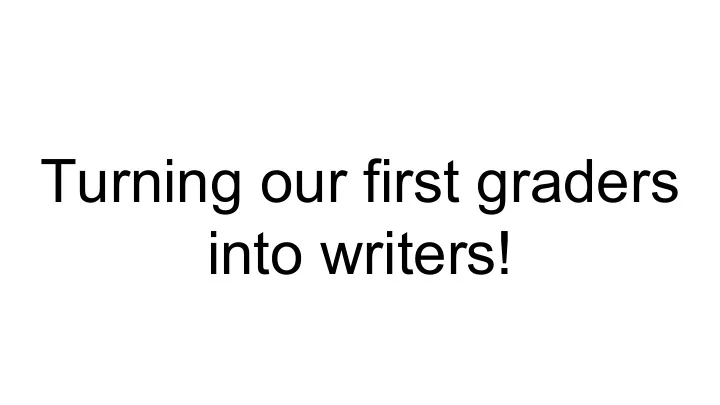

Turning our first graders into writers!
How we begin ... First, Writer’s Workshop is launched. Each day the teacher has a mini-lesson which is approximately 15 minutes to discuss what the child will do as a writer that day. When we are launching, we are teaching children the expectations for Writer’s Workshop time for them and for the teacher. Children are learning to select a topic and write about something that is important to them. Children also take home their Writing folder to decorate it with their families with ideas they can use for their stories.
Writers write about things and people they love... One of the first mini-lessons the teacher uses is brainstorming things and people that the writer loves. Writers write best about what they know.
Where can writers get what they need? Mini-lessons will concentrate on what the children are doing during this special time in our day. Some days they will be taught how to use the materials that are available to them. Writing centers are an integral part of this time. All materials are located in a central area with easy access. Some mini-lessons include the creation of an anchor chart that will hang in the writing center for students to use and refer to when needed.
Good writers use the room This is an important mini-lesson and we work to make sure there is a print-rich environment in which the children can use while writing. The children are able to find words in the room to use in their stories. If the words they need are easily accessed they do not slow their writing or lose their train of thought or idea.
Anchor charts that hang in the Writing Center! We also teach list writing to teach the children how to spell words using invented spelling. List writing is purposeful and used in real life so the children are able to connect to it. Children of all ability levels find success in generating lists.
Mentor Texts The teacher also immerses the children in mentor texts. These are texts that are carefully chosen by the teacher to show the craft of writing. It allows the children to learn from other authors. Children are motivated to write like these authors and question why an author chooses to write in certain ways. These are used for our Personal Narrative unit of study.
Connecting Writing to Reading Another way we foster our Writing Workshop is to connect it to our Reading Workshop. During read alouds, shared reading, independent reading children are immersed in the genre we are focused on during Writing Workshop. For example, we just began our How To unit of study and so we are reading aloud How To stories and shared reading big books with How To stories. Children can also peruse our leveled libraries to find How To books on their reading level.
Differentiated Instruction The teacher is facilitating each mini-lesson but most of Writer’s Workshop is driven by the children and their needs. Writing Workshop can be easily differentiated based on a child’s ability. No matter what, every child feels successful because they are becoming an author and illustrator. Peer partners are also used. This is a very exciting time because the children begin to question why they chose the ideas and words for their stories. This process also fosters great enrichment opportunities for those children who can write more. The children also have access to different kinds of writing paper to match their needs and to match the genre we are working on.
Conferencing While the children are writing, the teacher is conferencing with the children about their writing, asking questions, and allowing the children to facilitate the conversation and showing the teacher where their writing is headed with some guidance. We also have the ability to plan strategy groups. When conferencing we are able to notice what children might be struggling with when writing. A group of children might be struggling with the same skill so we can attack that efficiently and quickly.
Personal Narrative, our first unit of study Now that we’ve learned what good writers do, have our materials ready when we need them, we begin drafting our personal narrative or the story the children have chosen to tell. We ask that they choose one story idea and stick to it so we can continue to conference with them and teach them how to revise, edit, and finally publish! Here are some examples of how the children begin and I also brought some published stories for you to view!
Different Crafts for Different Genres Non-fiction Units of Study: How To Books (Procedural Writing) All About Books (Chapter books) Poetry Unit Author Study: Mem Fox Book Review/Writing about Reading
Recommend
More recommend